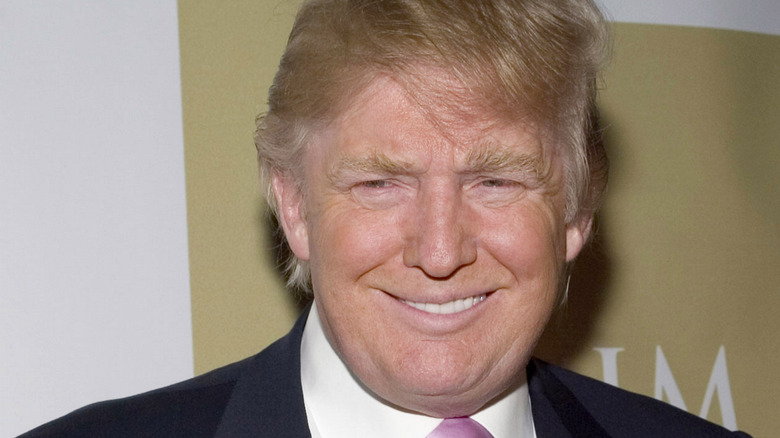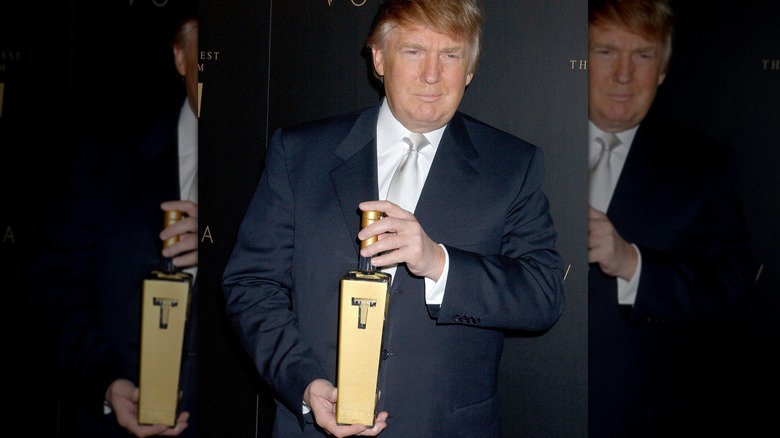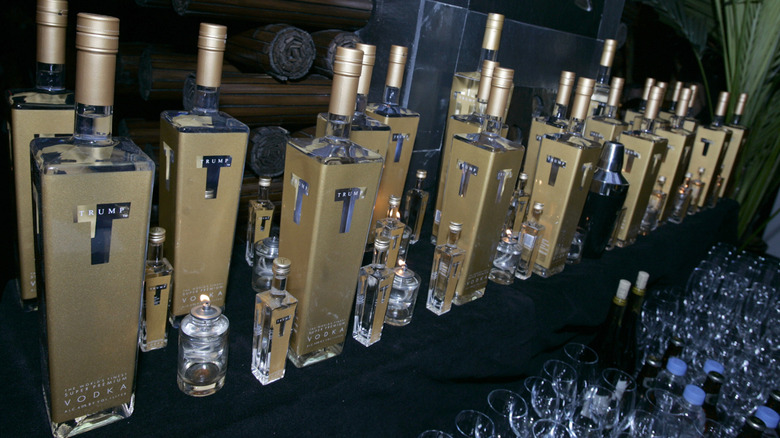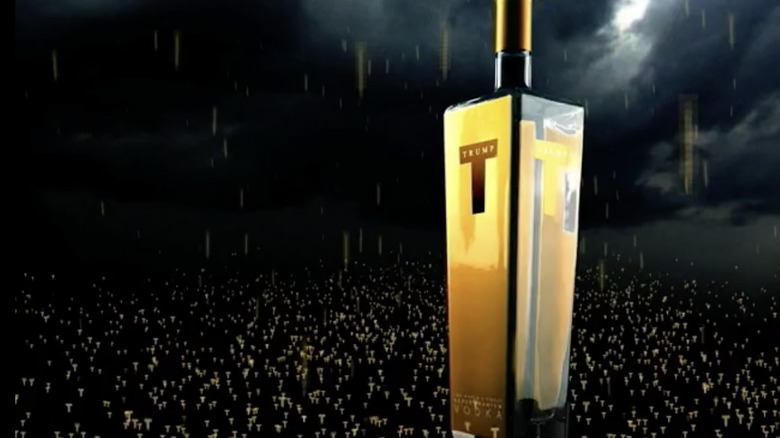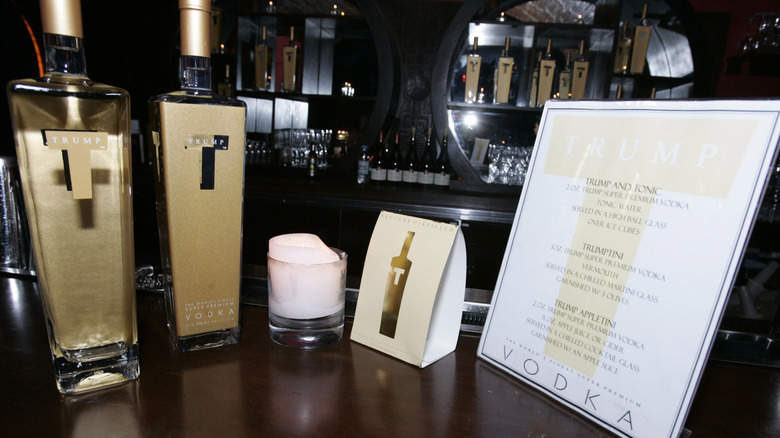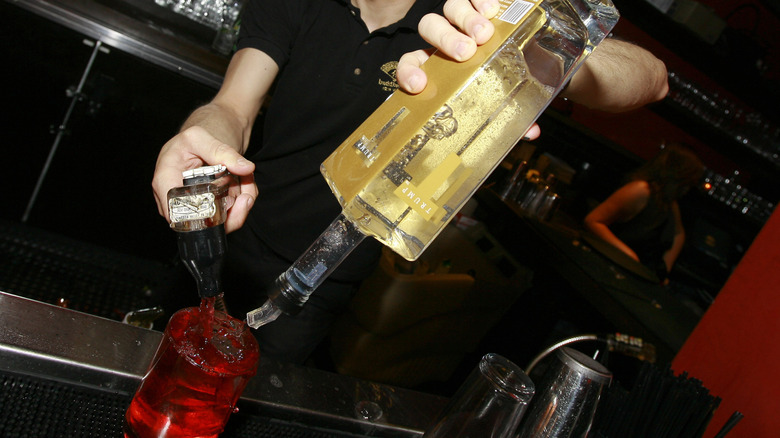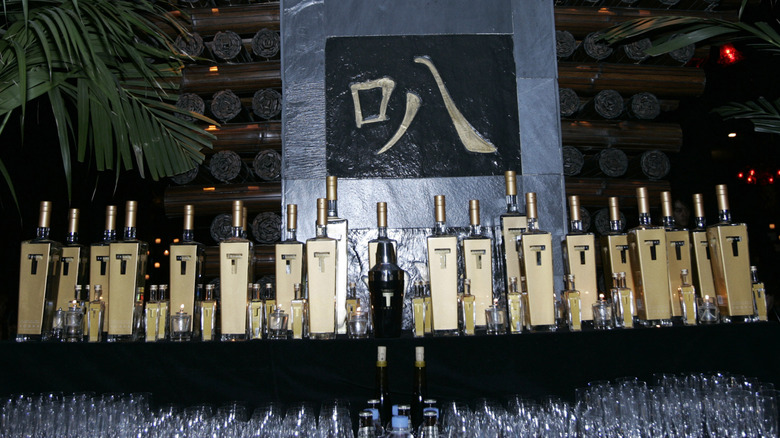What Happened To Trump Vodka?
With the bold slogan "Success Distilled," Trump Vodka splashed onto the scene in the mid-2000s with much fanfare. Swanky launch parties with gold-laden bottles marked the debut of one of many products that Donald Trump, the real estate mogul-turned-president, lent his name to. Despite this brash, confident launch, Trump Vodka sales nosedived after only a few short years. By 2011, distribution was halted in the United States.
So, what went wrong? Much like Trump's short-lived steak brand, the saga of Trump Vodka is convoluted. From the get-go, Trump-themed vodka was built on shaky ground, given that Trump doesn't drink alcohol. In a 2006 interview with Larry King, Trump stated that proceeds from Trump Vodka would "go to various studies on alcoholism and everything else," which was a peculiar promotional tactic. Plus, a bottle of Trump Vodka cost around $30, making it pricier than leading vodka brands.
While one might conclude that Trump Vodka was doomed from inception, it overcame initially rocky terrain to see considerable promise in the early years. However, in the end, a combination of external factors and self-inflicted wounds caused Trump Vodka to fail.
What was Trump Vodka?
Long before he decked out the Oval Office with golden baubles, Trump had a tendency to flaunt his wealth. In the early 2000s, the guiding principle of Trump's brand was his business acumen and the aspirational lifestyle that came with it. Trump Vodka followed this business model, postured as a higher-end product set to show up existing luxury-brand vodkas.
In all fairness, Trump Vodka did put its money where its mouth was, so to speak, when it came to production value. First, the vodka's foundation was a premium combination of high-quality European grains and purified spring water. It was distilled five times in hopes of cultivating the same smoothness associated with vodka juggernauts like Grey Goose.
Was Trump Vodka any good? It depends on who you ask. In 2016, a writer for Vice Media called it "just so-so," and noted it was "exceptionally harsh." Other reviews were favorable. A Drink Hacker review from 2008 gave Trump Vodka a B-plus grade, noting that it was smooth for an 80-proof spirit, with a "hint of sweetness and a light medicinal tone."
How Trump Vodka got its start
Despite touting Donald Trump's name, Trump Vodka was actually the brainchild of former Seagram employee J. Patrick Kenny. Inspired by 80s-era wine cooler commercials starring Bruce Willis, Kenny dreamed up the idea of creating a line of celebrity-endorsed alcohol products. In 2002, Kenny founded Drinks Americas and was on the lookout for a famous spokesperson. A mutual friend introduced Kenny to Trump, who agreed to grant his name to a new vodka brand. The deal was announced at the end of 2005.
Although Drinks America's market share value was relatively low, the company's future looked bright. Kenny also snagged high-profile partnerships with Willie Nelson and Roy Yamaguchi, selling bourbon and sake, respectively. However, there were warning signs from the beginning.
For starters, Kenny jumped the gun by announcing his product line before securing a distillery. When he eventually landed a deal with a distillery in the Netherlands, the owner, Rene Vriends, admittedly oversold his building's capabilities. Vriends was also a poor judge of the product's quality. Like Trump, Vriends did not drink vodka and didn't try Trump's version. Nonetheless, Trump Vodka prevailed, enjoying a relatively strong first year.
In Trump Vodka's early days, things were golden
Trump's affinity for gold and passion for high-rise real estate became integral to Trump Vodka's branding. The skyscraper-shaped bottles featured prominent T-shaped graphics and gold sides. Trump Vodka's expansion into the Russian market (a deal allegedly worth $1.5 million) was accompanied by an over-the-top commercial, ripe with gold-plated visuals and the song lyrics "money, money, money" bleating in the background. In early 2007, Drinks Americas announced a special $100 edition of Trump Vodka — the label was made from 24-karat gold leaf.
The premiere parties, held in major U.S. cities, were equally flashy. Trump himself attended the Hollywood launch, held at the then-popular club Les Deux. Some of the party's attendees were on the cusp of major fame, including Kim Kardashian and actress January Jones. Drinks Americas was pouring a lot of money and resources into Trump Vodka, and the pageantry seemed to pay off. Trump Vodka raked in $4.3 million in sales by January 2007.
Bad publicity and financial troubles began in 2008
Trump Vodka's early success was not to last. In February 2008, the brand ran into its first major scandal during a sponsored Super Bowl party. At first, the party seemed like another hit, attracting the likes of Paris Hilton and Brody Jenner, who were regulars on the nightlife circuit back then. Then, party photos surfaced of a 17-year-old hostess working at the Trump Vodka lounge while topless. Trump's team denied hiring the woman, claiming she snuck in to gain media attention for herself.
More trials and tribulations were in store for Trump Vodka. While scandal and poor decision-making from company leaders contributed to the brand's problems, some of its hardships were due to bad timing. In 2008, the U.S. was in the midst of the Great Recession. With Americans cutting back on spending, there simply wasn't as big of a market for expensive items. As the recession reached its apex in the final months of 2008, Trump Vodka's sales staggered.
Drinks Americas had already switched to a Chinese-based distributor to save money. After that, it resorted to lowering product prices. By the end of the year, Kenny announced that his company was in conflict with its bank lender due to fledgling profits.
Lawsuits and low sales spelled the end for Trump Vodka in the US.
Trump Vodka's financial troubles continued for the next couple of years. In 2009, the company could not even afford the glass bottles needed to distribute the alcohol. One glassmaker melted thousands of Trump Vodka bottles over unpaid invoices, and eventually filed a lawsuit for the outstanding balance. More lawsuits would follow.
By the fall of 2010, Trump Vodka was in an abysmal state. Sales were negligible, with only 184 cases sold from August to October. In perhaps the bleakest moment for Drinks Americas, Trump sued the company for $4.8 million, citing its failure to deliver promised royalties. In 2011, Trump Vodka essentially went extinct in the U.S., discontinued for not making adequate sales to justify distribution.
On the positive, Trump Vodka did have something of a second life in Israel. While Trump initially listed Drinks Americas' Israeli sales of Trump Vodka as unauthorized use in his lawsuit, he apparently had a change of heart later in the year. He allowed the import company H. Pixel International to continue to sell Trump Vodka in Israel, albeit with a different manufacturer. Given the Israeli version was made sans wheat, it's considered kosher, so Trump Vodka became popular around Passover. However, in 2016, Trump Vodka suffered a mini-scandal. News broke that a production error three years prior led to some non-kosher bottles being erroneously labeled. They were subsequently pulled from the shelves.
Can you still buy Trump Vodka today?
Despite being officially discontinued, Trump Vodka is still sold in Israel. There is a market for old Trump Vodka bottles on eBay, an interest that grew considerably during Donald Trump's first term as president. You can still find bottles online, sometimes priced in the thousands and sometimes just a few hundred dollars. Given Donald Trump is now in his second nonconsecutive term as president, there might be a spike in interest in Trump Vodka in the coming years.
In 2024, Rau IT, a Russian technology company, filed a trademark application for a new version of Trump Vodka. Unrelated to the Drinks Americas brand, this liquor is called Trumpovka, and the proposed label features a graphic of Trump playing an accordion. Apparently, Rau IT preemptively filed the patent to beat potential competitors to the punch. There are no immediate plans to roll out an actual product. The company merely wanted to protect the name from rival businesses that might try to capitalize on breaking news involving President Trump.
